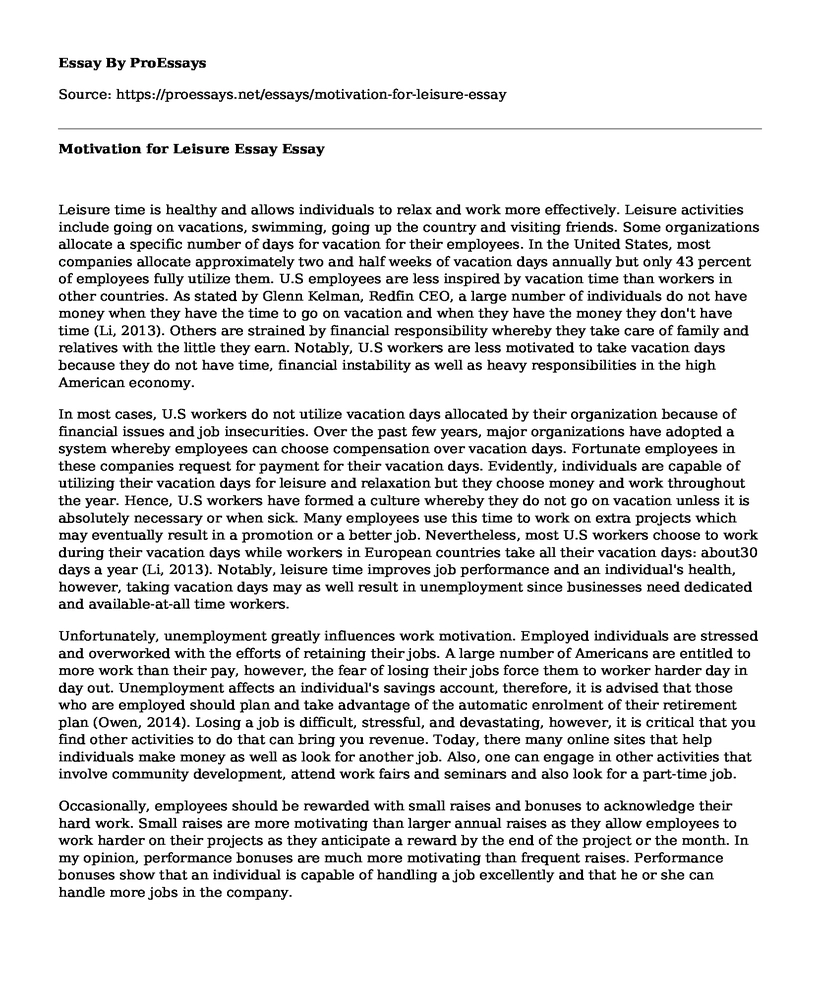Leisure time is healthy and allows individuals to relax and work more effectively. Leisure activities include going on vacations, swimming, going up the country and visiting friends. Some organizations allocate a specific number of days for vacation for their employees. In the United States, most companies allocate approximately two and half weeks of vacation days annually but only 43 percent of employees fully utilize them. U.S employees are less inspired by vacation time than workers in other countries. As stated by Glenn Kelman, Redfin CEO, a large number of individuals do not have money when they have the time to go on vacation and when they have the money they don't have time (Li, 2013). Others are strained by financial responsibility whereby they take care of family and relatives with the little they earn. Notably, U.S workers are less motivated to take vacation days because they do not have time, financial instability as well as heavy responsibilities in the high American economy.
In most cases, U.S workers do not utilize vacation days allocated by their organization because of financial issues and job insecurities. Over the past few years, major organizations have adopted a system whereby employees can choose compensation over vacation days. Fortunate employees in these companies request for payment for their vacation days. Evidently, individuals are capable of utilizing their vacation days for leisure and relaxation but they choose money and work throughout the year. Hence, U.S workers have formed a culture whereby they do not go on vacation unless it is absolutely necessary or when sick. Many employees use this time to work on extra projects which may eventually result in a promotion or a better job. Nevertheless, most U.S workers choose to work during their vacation days while workers in European countries take all their vacation days: about30 days a year (Li, 2013). Notably, leisure time improves job performance and an individual's health, however, taking vacation days may as well result in unemployment since businesses need dedicated and available-at-all time workers.
Unfortunately, unemployment greatly influences work motivation. Employed individuals are stressed and overworked with the efforts of retaining their jobs. A large number of Americans are entitled to more work than their pay, however, the fear of losing their jobs force them to worker harder day in day out. Unemployment affects an individual's savings account, therefore, it is advised that those who are employed should plan and take advantage of the automatic enrolment of their retirement plan (Owen, 2014). Losing a job is difficult, stressful, and devastating, however, it is critical that you find other activities to do that can bring you revenue. Today, there many online sites that help individuals make money as well as look for another job. Also, one can engage in other activities that involve community development, attend work fairs and seminars and also look for a part-time job.
Occasionally, employees should be rewarded with small raises and bonuses to acknowledge their hard work. Small raises are more motivating than larger annual raises as they allow employees to work harder on their projects as they anticipate a reward by the end of the project or the month. In my opinion, performance bonuses are much more motivating than frequent raises. Performance bonuses show that an individual is capable of handling a job excellently and that he or she can handle more jobs in the company.
Conclusion
In essence, performance bonuses increase the likelihood of a job promotion (Owen, 2014). In some cases, performance bonuses are equal to the raises entitled in a year but other times it is much more depending with the employee job performance. In the United States, salaries are expected to rise by 3 percent. This attribute highly motivates employees to work harder and retain their jobs. Salary increase helps individuals improve their living standards which ensure that they are healthy and content to work in their assigned jobs.
References
Li, Y. B. (2013). Global aging issues and policies: Understanding the importance of comprehending and studying the aging process. Springfield, Illinois: Charles C Thomas, Publisher, Ltd.
Owen, J. D. (2014). The price of leisure: An economic analysis of the demand for leisure time.
Cite this page
Motivation for Leisure Essay. (2022, Jul 01). Retrieved from https://proessays.net/essays/motivation-for-leisure-essay
If you are the original author of this essay and no longer wish to have it published on the ProEssays website, please click below to request its removal:
- Research Paper on Factors Affecting Employees' Productivity
- Research Paper on Effect of Video Games on the Brain
- Essay on the Benefits of International Business: Understanding & Shaping Your Career
- Paper Example on Build a Long-Term Career in HR: Get the Right Foundation
- Truth-telling: Building an Encouraging Working Environment - Essay Sample
- Essay on Interviewing Health Care Professionals: Putting Learning Into Practice
- Paper Example on Amazon.com: Global Giant in Retail E-commerce, CSR Commitment Questioned







